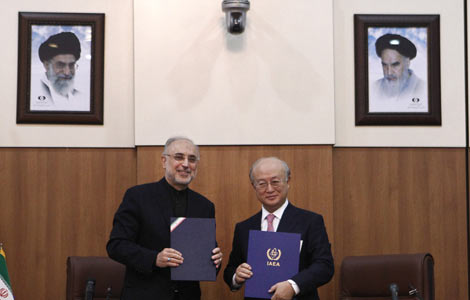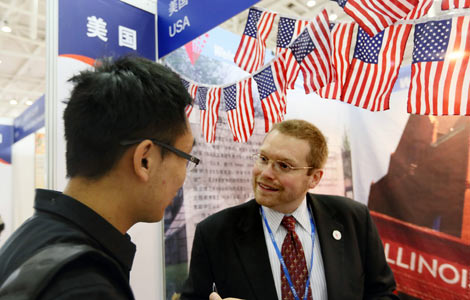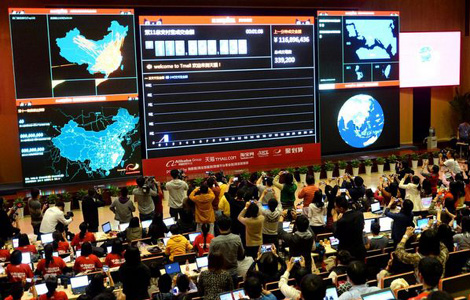Global talent lacking in China
Updated: 2013-11-12 01:04
By Yang Yao (China Daily)
|
||||||||
Nation needs to offer incentives to attract foreign executives: experts
China needs to develop better policies to attract professionals from abroad to work in Chinese companies, helping to power the shift from "Made in China" to "Created in China", according to experts.
"There are so many companies in China that need global talent, but there are only a few thousand available in the Chinese market," said Wang Huiyao, director-general of the Center for China and Globalization.
According to his research, China needs 75,000 executive managers with global experience in the next five to 10 years, but there are only 3,000- to 5,000 people in the local market who meet the necessary criteria.
Wang said that a new era has arrived in which Chinese companies are increasingly expanding and doing business overseas, a fact that calls for professionals and managers with international backgrounds.
Last year, China's overseas investment reached $72.2 billion, and this year, China's foreign investment is expected to top $100 billion for the first time.
According to Fortune Magazine's 500 Top Global Companies List this year, China has a record number of 89 companies listed, next only to the United States.
"However, most of these companies are still domestic-oriented," said Wang. "For these companies that wish to get more market share globally, one of the key challenges is that they don't have enough global talent — particularly global executive talent."
"China will need many more global executives and managers to cope with the rapid increase of Chinese companies, global investment and business activities," he said.
Zheng Hong, HR manager with Hangzhou Hongsheng Beverage Group, the mainland's largest soft drinks company by sales, expressed the same wish.
"We hope to create our own brand, which can influence and change consumption habits in the global beverage industry," she said. "But we are lacking innovative people who are capable of doing so."
The fields most in need of professional talent from abroad include hi-tech industries, energy/natural resources, healthcare and life sciences, according to the 2013 Executive Search Industry Global Outlook Report, by the Association of Executive Search Consultants.
"The senior executive talent shortage is the most visible this year in China," said Peter Felix, president of the New York-based global headhunting organization.
Citing one example of the penetration of foreign talent into the Chinese business world, Felix said that around half of Lenovo's board of directors are American.
"In order to retain this high-end group of talent, China needs to compete with other countries," he said. Liu Huaisong, chairman of Zhongguancun Talent Association, said that compared with Silicon Valley in United States where more than 40 percent of the companies are started by foreigners, Zhongguancun, China's "Silicon Valley", has a low proportion of overseas talent.
Felix told China Daily that his organization, as well as the China Global Talent Society and Zhongguancun Talent Association, are joining forces to help Chinese high-tech companies search executives globally.
"In this sense, China needs to create a whole package, including visa policy, education, retirement, legal system and also environment, to attract them," Felix said.
However, there are tensions between the need for global talent and current social policies.
Lin Lei, deputy head of human resources for Microsoft China, said that the issuing of visas is a big issue.
"If there were more green cards issued to the senior executives, things would be easier," she said, citing the example of Zhang Yaqin, corporate vice-president of Microsoft, who was born in China but now holds a US passport.
According to data from the Ministry of Public Security, China had only issued 4,752 green cards to foreign residents by the end of 2011.

 Typhoon Haiyan claims 6 in S. China
Typhoon Haiyan claims 6 in S. China
 Iran to give UN inspectors more access to nuclear sites
Iran to give UN inspectors more access to nuclear sites
 In love with Yunnan
In love with Yunnan
 Online shopping gala sets records
Online shopping gala sets records
 Report shows jump in Chinese students going to the US
Report shows jump in Chinese students going to the US
 2 killed in Texas party shooting
2 killed in Texas party shooting
 Traditional retail battles websites
Traditional retail battles websites
 Singles Day becomes China's Black Friday
Singles Day becomes China's Black Friday
Most Viewed
Editor's Picks

|

|

|

|

|

|
Today's Top News
ABC apologizes again for Kimmel 'joke' debacle
Global talent lacking in China
Journalists lead lonely-heart list
Iran to give UN inspectors more access
Reform expected to dominate talk at plenum
Real-estate bubble seen bursting
More Chinese students going to US
Online shopping gala sets records
US Weekly

|

|






